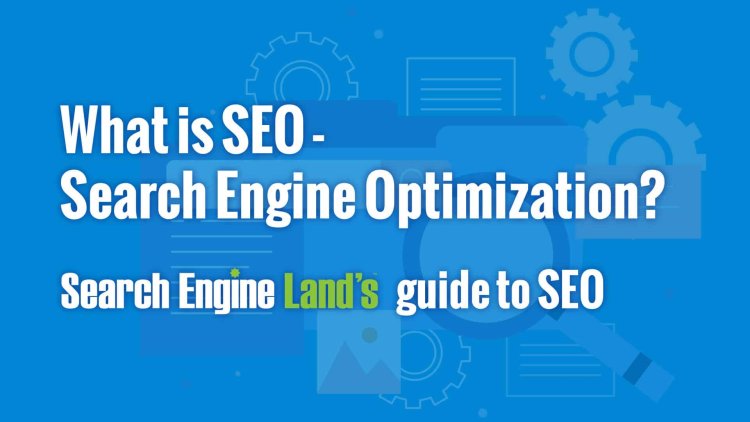Unlocking Success: SEO Strategies for Job Seekers and Businesses
In today's digital age, mastering Search Engine Optimization (SEO) is crucial whether you're on the hunt for a job or aiming to dominate the market. SEO isn't just about visibility; it's about strategically positioning yourself or your business where it matters most—online.

In today's digital age, mastering Search Engine Optimization (SEO) is crucial whether you're on the hunt for a job or aiming to dominate the market. SEO isn't just about visibility; it's about strategically positioning yourself or your business where it matters most—online.
SEO for Job Seekers:
For job seekers, SEO is your secret weapon. Here’s how you can leverage it:
-
Optimize Your LinkedIn Profile: Your LinkedIn profile is your digital resume. Use keywords relevant to your industry in your headline, summary, and job descriptions to increase your profile's visibility.
-
Create Personal Branding Content: Start a blog or contribute articles to platforms in your niche. This not only showcases your expertise but also boosts your online presence.
-
Network Strategically: Connect with industry professionals and influencers. Engage with their content and participate in discussions to increase your visibility.
-
Stay Active on Social Media: Share relevant content, engage with your network, and use industry-specific hashtags to expand your reach.
-
Monitor Your Online Presence: Google yourself regularly to see what potential employers might find. Clean up any unprofessional content and ensure your professional profiles are up to date.
SEO for Businesses:
For businesses, SEO is the key to staying ahead of competitors and reaching your target audience effectively:
-
Keyword Optimization: Research and use relevant keywords that potential customers are searching for. Integrate these keywords naturally into your website content, blog posts, and social media.
-
Quality Content Creation: Produce high-quality content that addresses the needs and interests of your target audience. Content such as blogs, videos, and infographics not only engage your audience but also improve your search engine rankings.
-
Mobile Optimization: Ensure your website is mobile-friendly. With more users accessing the internet via smartphones, mobile optimization is crucial for both user experience and SEO.
-
Local SEO: If you have a physical location, optimize your website for local searches. This includes claiming your Google My Business listing, getting reviews, and using local keywords.
-
Link Building: Build relationships with reputable sites in your industry to earn backlinks. Quality backlinks are a significant ranking factor and can drive organic traffic to your website.
Demystifying SEO:
SEO doesn’t have to be complicated. It's about understanding your audience, delivering valuable content, and ensuring your online presence is easily discoverable. Whether you're a job seeker or a business owner, implementing effective SEO strategies can make a significant difference in your success.
By investing in SEO, you’re investing in your future. Start implementing these strategies today and watch your visibility—and opportunities—grow. Ready to take your SEO game to the next level? Contact us to learn how we can help you achieve your goals through tailored SEO solutions.
Here's an overview of SEO, covering On-Page SEO, Off-Page SEO, and Technical SEO:
1. On-Page SEO:
On-Page SEO refers to optimizing individual web pages to rank higher and earn more relevant traffic in search engines. It involves several key elements:
-
Keyword Optimization: Researching and using relevant keywords throughout your content, including in titles, headings, meta descriptions, and body text.
-
Content Quality: Creating high-quality, valuable content that meets the search intent of users. This includes using multimedia like images and videos, and ensuring readability and engagement.
-
Meta Tags: Writing compelling meta titles and meta descriptions that include keywords and accurately describe the page's content.
-
URL Structure: Creating SEO-friendly URLs that are descriptive, short, and include keywords where appropriate.
-
Internal Linking: Linking to other relevant pages within your website to improve navigation and distribute page authority.
-
Page Speed: Optimizing page loading times to enhance user experience, which is a ranking factor in search engines.
2. Off-Page SEO:
Off-Page SEO focuses on activities outside your website that impact your search engine rankings. Key aspects include:
-
Link Building: Acquiring backlinks from reputable and relevant websites. Quality backlinks are crucial for improving domain authority and search engine rankings.
-
Social Signals: Engaging on social media platforms and generating shares and likes can indirectly impact SEO by increasing brand visibility and traffic.
-
Online Reputation: Building a positive online reputation through reviews, testimonials, and mentions can enhance credibility and authority.
-
Guest Blogging: Publishing content on external websites with a link back to your site can drive referral traffic and improve SEO.
3. Technical SEO:
Technical SEO involves optimizing the technical aspects of your website to improve its crawling and indexing capabilities by search engines. Key components include:
-
Crawlability: Ensuring search engine bots can crawl and index your website effectively. This involves using robots.txt, XML sitemaps, and managing redirects.
-
Site Structure: Creating a logical and user-friendly site structure that makes it easy for visitors and search engines to navigate.
-
Mobile Friendliness: Ensuring your website is responsive and works well on different devices, as mobile-friendliness is a significant ranking factor.
-
Site Speed: Optimizing loading times by reducing server response times, leveraging browser caching, and minimizing CSS and JavaScript files.
-
Secure Website: Implementing HTTPS encryption to secure user data and improve trustworthiness. Secure sites are favored by search engines.

What's Your Reaction?
















